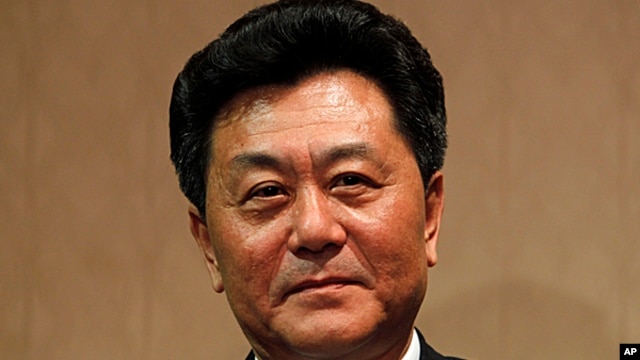
FILE - Li Gang, deputy director of the central Chinese government's liaison office in Hong Kong,
May 24, 2010.
MACAU — With little
fanfare, China is sending an official with a 'tough cop' reputation to be its
top man in Macau, the world's biggest gambling hub, as Beijing puts tackling
corruption centre stage.
Li Gang, a veteran of handling contentious issues in Hong Kong, is slated to
this year take control of China's liaison office in the former Portuguese
colony - which like Hong Kong is a special administrative region under China's
'one country, two systems' principle.
The office, China's representative in Macau, has deepened its ties with casino
and junket operators, who helped bring in over two-thirds of Macau's $38
billion in revenues last year.
The low-key but significant moves signal a deliberate attempt by China to be
more directly involved in the oversight of Macau, which has drawn unwanted
attention with reports of mainland officials laundering state funds and betting
millions in the casinos' high-roller VIP rooms.
Rather than signalling a crackdown on Macau's lucrative gambling industry,
casino executives say the target is those Chinese officials using public money
or pledging state assets to gamble - money that could otherwise be invested in
businesses.
For example, Yang Kun, a vice president at Agricultural Bank of China, owed
Macau casinos 3 billion yuan ($490 million) in gambling debts, while local
media have reported former high-flying politician Bo Xilai laundered money
through Macau. There has been no official ruling on either case.
"They are taking a much more proactive role. The Chinese government is
more concerned about assets being wasted," said a senior executive at a
Macau casino, who didn't want to be named due to the sensitivity of the
situation. "For them, it's not about the funds being gambled, but about
businesses or factories being squandered."
CLOSER SCRUTINY
China has revamped its anti-money laundering rules, Reuters reported this
month, and Macau is overhauling its laws to set more explicit requirements to
detect suspicious transactions. Francis Tam, Secretary for Economy and Finance,
has said there will be stricter oversight of the gaming industry, with the
government paying closer attention to abnormal capital flows.
Suspicious transaction reports in Macau rose by almost a fifth last year to
1,840, and more than 70 percent of those were related to the gaming industry,
according to Macau's Financial Intelligence Office.
Li, who sits on the Chinese Communist Party's Central Commission for Discipline
Inspection, was appointed deputy director of the Macau liaison office in
December, and political analysts expect him to be China's main representative
later this year when the current chief is due to retire.
Having won plaudits for his firm handling of elections and electoral reform in
Hong Kong as deputy director, Li has been quoted by local media as saying
anti-corruption efforts are in line with a broader effort - and one of new
Chinese President Xi Jinping's priorities - to tackle graft and the illicit
outflow of funds, rather than a crackdown on Macau's gaming industry.
MORE INVOLVED
Located on the tip of China's southern coast, Macau is the only place in China
where casinos are legal, and more than two-thirds of its visitors come from the
mainland. Each month, gaming rakes in more than half of Las Vegas' annual
revenue of $6.2 billion.
"China's government is always focusing and concentrating on Macau's
development," said a representative of the liaison office - which works
from a recently renovated building that towers above the gaudy casinos and
ubiquitous pawn shops - in response to a question on whether the government was
increasing its attention on Macau.
After the release of notorious mobster Wan "Broken Tooth" Kuok-koi in
December, representatives from the liaison office informed casino operators
that if they faced any trouble they should go directly to them. Under
Portuguese control, VIP junket operators like Wan tended to take matters into
their own hands, resulting in frequent and bloody violence in the 1990s.
Macau junkets are companies or individuals authorized to issue credit to
gamblers and settle any subsequent debts. The biggest junket firms run
multi-billion dollar operations. Alvin Chau, founder of one of the leading
operators Suncity Group, was this year selected as a member of China's CPPCC
Guangdong provincial committee, elevating his political credentials.
Macau's first Junket Association was created on the eve of "Broken
Tooth's" release, with operators, liaison office representatives and local
regulators attending a lavish dinner at Las Vegas Sands Corp's new resort.
Photos and videos of the dinner posted online show junket operators taking
oaths, raising their right hand and reading from a small piece of white paper
in the other.
"The association will strive to work together to keep society stable and
the economy flourishing and transform Macau into an international city,"
the Apple Daily quoted the association's president Guo Zhizhong as saying.
Deborah Ng, director of Macau's Financial Intelligence Office, has said that
casino operators have adequate controls in place to detect if government
officials or high-ranking politicians are gambling.
"I think there's improvement. I can't say what we have done now will
totally prevent the risk, but actually we can see that things are
improving," Ng said.

No comments:
Post a Comment
yes